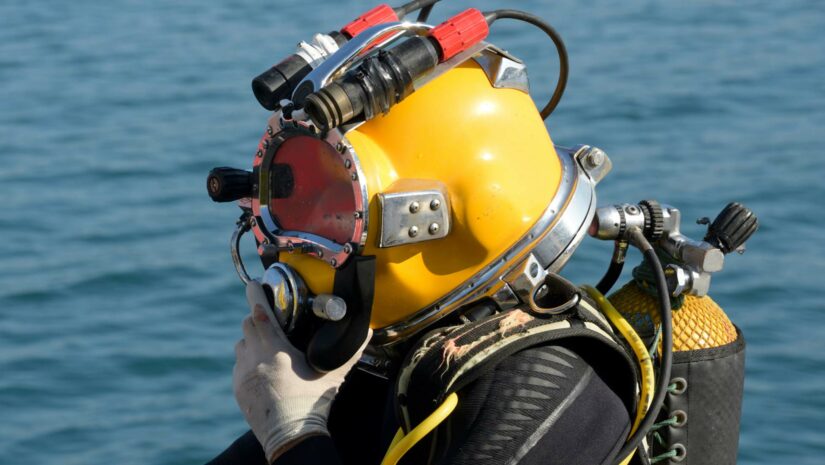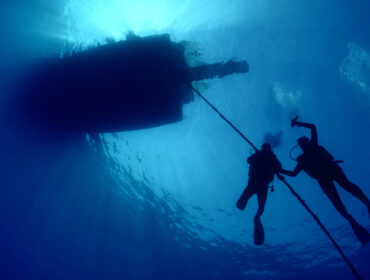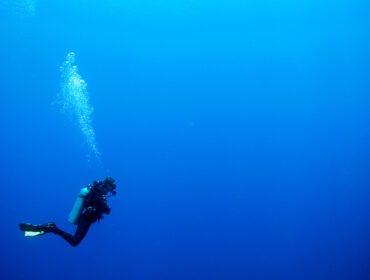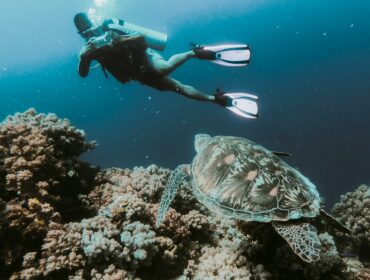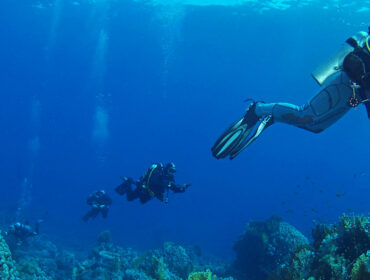Underwater diving is truly an exciting and fulfilling recreational activity. However, for many, it can also be a highly interesting and lucrative profession. After all, who doesn’t want to get paid while doing something they enjoy?
Commercial diving is an unusual profession that covers a wide range of activities, as well as various trades and skills. You’ve got your offshore diver who works for the oil and gas industry, media divers who do underwater photography and videography, inland divers specializing in commercial operations in smaller bodies of water, highly-skilled HAZMAT (Hazardous Materials Technician) and nuclear divers for high-risk missions, scientific divers, military or naval divers, and even investigative police divers.
Believe it or not, professionally trained divers aren’t the only ones who have the option to turn their hobby into a full-fledged career and literally combine work and play. As long as you have a high school diploma, are physically fit (you’ll have to pass a diving physical), and meet the age requirements, you are eligible to take the next step in your new diving career by joining a training program and getting certified.
If you’re interested in starting a career in commercial diving, you’re probably already aware of the long journey ahead of you—and it all starts with getting into a top-notch commercial diving school.
Top Commercial Diving Colleges

For truly professional training that’s sure to be of good use for your impending career, you’ll need to get into an institution that specializes in teaching commercial diving or, even better, the specific type of commercial diving that interests you. Below you’ll find a list of some of the best and most well-known commercial diving colleges in the country.
Divers Institute of Technology (DIT)
Location: Seattle, Washington
The Divers Institute of Technology (DIT) is known for training quality divers and has been around since 1968. This veteran owned and operated diving school was the first and currently one of the only three programs in the US to offer the globally-recognized CSA (Canadian Standards Association) Unrestricted Surface Supplied Air Diver Certification, which opens up career and travel opportunities around the world.
The institution doesn’t train students into specifically becoming underwater welders or particular types of divers but rather molds them into becoming well-rounded and adaptable commercial divers through intensive, mostly open water training for a more real-world experience. You’ll complete 165-foot dives, where you’ll learn all about in-water and surface decompression.
Their program is currently seven months long and has seven courses. It includes Physics & Medicine, where students will get a good understanding of how these factors can affect each dive; Lightweight & Rigging in the 2nd month; offshore and HAZMAT diving for simulated real-world projects where you’ll work with teams in the 3rd month; and deep water welding. The program will conclude with a three-week Deep Dive course where everything you’ve learned from previous courses will come together.
Santa Barbara City College
Location: Santa Barbara, California
The Santa Barbara City College offers a Marine Diving Technology Program to produce the best quality divers and marine technicians who can work both above and underwater—with the most sophisticated marine data collection, diving, and life-support equipment—to meet the demands of specific industries, including construction, research, and tourism, around the world.
The program provides vocational excellence to all, from beginner students to current employees in the commercial diving industry, and is the only community college degree program in the country that is accredited by the Association of Commercial Diving Educators (ACDE), the International Diving Schools Association (IDSA) Diver Certification Board of Canada (DCBC), and the National Association of Underwater Instructors (NAUI).
Graduates can obtain either an Associate in Science Degree or Certificate in Marine Technology. The former includes comprehensive instructions in hyperbarics, emergency medicine, marine science, and the phases of commercial diving, to name a new. ANSI Certification for Commercial Diver Training and ADC Certification for Commercial Diving are also available under this SBC College department.
National University Polytechnic Institute
Location: San Diego, California
The National University Polytechnic Institute’s commercial diving and underwater welding school offers courses like Diving Physics, Hyperbaric Medicine, and Rigging Fundamentals, among others. Students are given the opportunity to learn in a classroom setting and test their acquired practical knowledge in the school’s 40,000-gallon tank, as well as by the Coronado Bay.
The commercial diving classes at the NUPI gets filled up pretty quickly as they only hold four 8-month-long courses every year. By the end of the program, you will have gained significant knowledge in commercial diving, underwater welding, advanced dive medicine, and nondestructive testing. The first two are interrelated, as the school highlights the importance of first becoming a trained professional diver before getting into underwater welding. Because of this, the NUPI allows its commercial diving students to join the welding course at no additional cost.
Graduates will receive certifications such as a Professional Certificate in Marine Technology, an Association of Diving Contractors International (ADCI) Entry Level Diver/Tender card, an Association of Commercial Diving Educators (ACDE) card, a NUPI Underwater Welding course completion certificate, NUPI Rigging certificate, CPR Certification, and more.
Minnesota Commercial Diver Training Center
Location: Brainerd, Minnesota
The Minnesota Commercial Diver Training Center offers a much shorter program that’s only 11 weeks long, but students get to maximize their learning experience by being part of a smaller class (only 12 students per course) that allows longer dive times and a lot of open water training early on.
Training programs are held right in the heart of Minnesota, particularly in the Mississippi River and in the Cuyuna Mine Pits in Crosby/Ironton. The school also has a 14-foot deep tank where students can learn diving protocols, proper use of diving equipment, and other diving basics before hitting open waters.
The comprehensive outline for the MCDTC’s commercial diving program includes courses about the Principals of Diving Physics, air decompression tables, decompression procedures, diving diseases/injuries and treatment, diving environmental hazards, the Hyperbaric Chamber, industrial and offshore safety, and many other practical and technical lessons. Upon completion of the program, graduates will be awarded the ADCI (Association of Diving Contractors International) and Canadian DCBC International Certification.
International Diving Institute
Location: Charleston, North Carolina
The International Diving Institute prides themselves on their students’ 92% employment rate right after graduation. The school offers multiple intensive commercial diving programs that touch on air/mixed gas diving, underwater welding (with certification), HAZWOPER (Hazardous Waste Operations and Emergency Response) / HAZMAT (Hazardous Materials Technician) diving, underwater burning (with certification), ROV piloting, and training of potential diving supervisors.
Despite being one of the most prestigious commercial diving institutes in the country, the IDI offers affordable tuition rates, the smallest class sizes, veteran instructors, and efficient placement programs that give students the opportunity to learn, test, and enhance their knowledge and skills in the real world.
The program also assists military veterans in their transition to having a civilian career in commercial diving.
South Central Louisiana Technical College
Location: Morgan City, Louisiana
The South Central Louisiana Technical College in Young Memorial, Morgan City also offers both classroom instruction and practical experience to train students into becoming professional commercial divers fit for local and international employment. Their program runs over the course of seven months, during which students and experienced divers learn about the physics and physiology of hyperbaric environments, and then gain practical experience in equipment operations and maintenance.
Programs and certifications include the Certificate of Technical Studies – Commercial Diving, ADCI (Association of Diving Contractors International), ACDE (Association of Commercial Diving Educators), Safegulf Card, API Rigging, CPR / First Aid, and Water Survival with METS (Modular Egress Training Simulator).
With the SCLTC’s curriculum focusing on acquiring all the necessary knowledge and on performing actual work for safe and efficient underwater operations, the school aims to develop well-rounded commercial divers with competitive occupational and employability skills.

